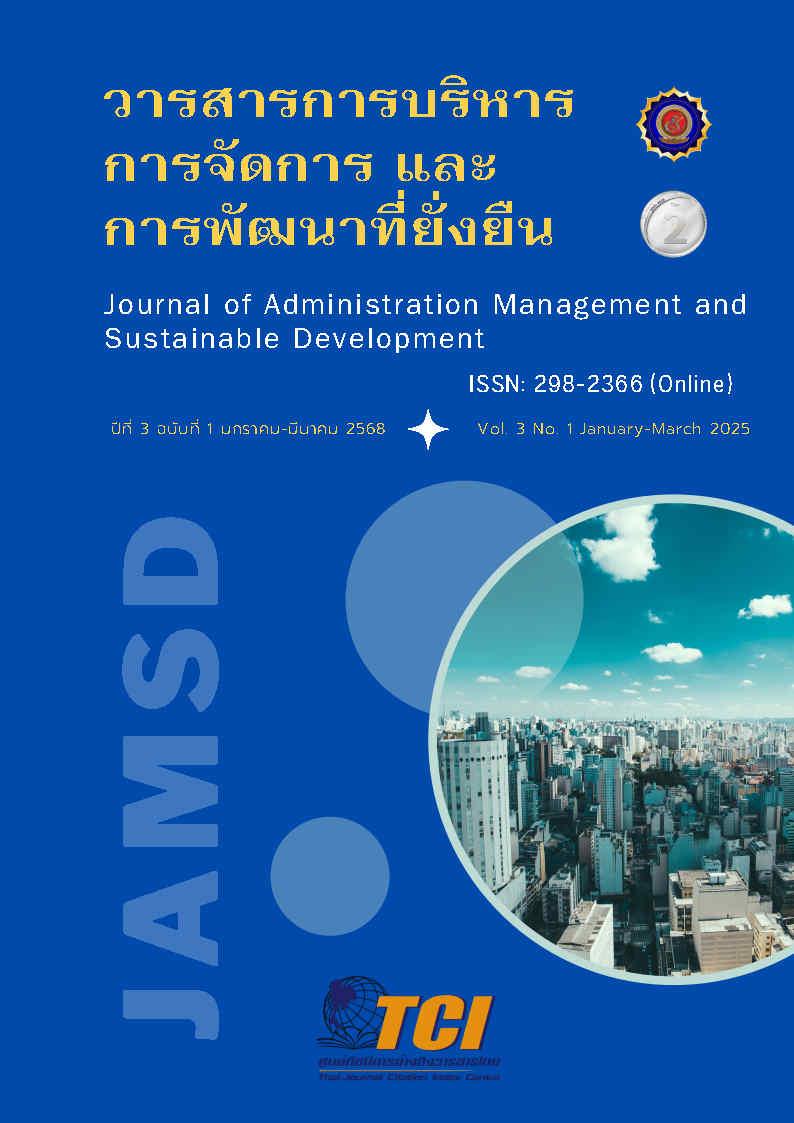Visionary leadership in the 21st century among school administrators at the District Learning Promotion Center, Rak Chanod zone group
Keywords:
visionary leadership,, 21st century,, school administrators,, learning promotion centerAbstract
This research to study the leadership in the 21st century and guidelines for developing visionary leadership in the 21st century among school administrators at the District Learning Promotion Center,
Rak Chanod Zone Group. The population of 140 teachers sample group includes 103 teachers from
the District Learning Promotion Center, Rak Chanod Zone Group, categorized as 8 government teachers and 95 government employees. The sample was obtained through multistage proportional sampling and simple random sampling. The research instruments were with validity between 0.67-1.00 and reliability of 0.93 and interviews. Using google forms from 98 participants (95.15%) from e-mail. Analysis statistics including frequency, percentage, mean, standard deviation and content analysis. The results of the study found that: 1. The visionary leadership in the 21st century of school administrators in the District Learning Promotion Center, Rak Chanod Zone Group was high. When considering individual aspects, vision creation had the highest mean, followed by vision dissemination and vision implementation. Vision evaluation had the lowest mean. 2. Guidelines for developing visionary leadership in the 21st century for school administrators in the District Learning Promotion Center, Rak Chanod Zone Group. School administrators should organize brainstorming and set challenging goals, communicate diversely and accessibly using media, rewards should be aligned with the vision. The organizational structure and culture should be adjusted to facilitate the achievement of the vision, clear and measurable indicators should be established, and evaluation results should be used to continuously improve the vision.
References
นฤมล คูหาแก้ว. (2563). ภาวะผู้นำของผู้บริหารสถานศึกษาในศตวรรษที่ 21 สังกัดสำนักงานเขตพื้นที่การศึกษประถมศึกษาสระแก้ว เขต 2. วิทยานิพนธ์คุรุศาสตรมหาบัณฑิต สาขาวิชาการบริหารการศึกษา มหาวิทยาลัยราชภัฏรำไพพรรณี.
นิภาพร รอดไพบูลย์. (2565). ทักษะการบริหารในศตรวรรษที่ 21 ของผู้บริหารสถานศึกษา สังกัดสำนักงานเขตพื้นที่การศึกษามัธยมศึกษาสระแก้ว. งานนิพนธ์ศึกษามหาบัณฑิต สาขาวิชาการบริหารการศึกษา มหาวิทยาลัยบูรพา.
บุญชม ศรีสะอาด. (2560). การวิจัยเบื้องต้น (พิมพ์ครั้งที่ 10). กรุงเทพฯ: สุวีริยาสาส์น.
รัตนา คนไว. (2565). ภาวะผู้นำเชิงวิสัยทัศน์ของผู้บริหารสถานศึกษาที่ส่งผลต่อประสิทธิผลการปฏิบัติงานของครูในโรงเรียน สังกัดสำนักงานเขตพื้นที่การศึกษามัธยมศึกษามุกดาหาร. วิทยานิพนธ์คุรุศาสตรมหาบัณฑิต สาขาวิชาการบริหารและพัฒนาการศึกษา มหาวิทยาลัยราชภัฏสกลนคร.
สำนักงานคณะกรรมการการศึกษาขั้นพื้นฐาน. (2556). หลักสูตรการศึกษาผู้บริหารสถานศึกษาหลักสูตรประกาศนียบัตรบัณฑิต (กศ.บ.) รุ่นที่ 2. กรุงเทพฯ: สำนักงานคณะกรรมการการศึกษาขั้นพื้นฐาน.
สำนักงานเลขาธิการสภาการศึกษา. (2560). แผนการศึกษาแห่งชาติ พ.ศ. 2560 – 2579. กรุงเทพฯ: พริกหวานกราฟฟิค.
สำนักงานคณะกรรมการพัฒนาการเศรษฐกิจและสังคมแห่งชาติ. (2561). แผนพัฒนาเศรษฐกิจและสังคมแห่งชาติ ฉบับที่ 12 (พ.ศ. 2560 - 2564). กรุงเทพฯ: สำนักงานคณะกรรมการพัฒนาการเศรษฐกิจและสังคมแห่งชาติ.
สำนักงานส่งเสริมการเรียนรู้จังหวัดอุดรธานี. (2566). แผนปฏิบัติราชการประจำปี 2566. สืบค้นจาก https://www.udonthani.go.th/main/download/acttion_plan66/.
สุภาวัฒน์ แสงคำมี. (2561). ปัจจัยคุณลักษณะด้านการสื่อสารที่ส่งผลต่อภาวะผู้นำเชิงวิสัยทัศน์ของ ผู้บริหารสถานศึกษา สังกัดสำนักงานเขตพื้นที่การศึกษาประถมศึกษาพิษณุโลก เขต 3. วิทยานิพนธ์ครุศาสตรมหาบัณฑิต สาขาวิชาการบริหารการศึกษา มหาวิทยาลัยราชภัฏพิบูลสงคราม.
สุริยา ฆ้องเสนาะ. (2558). บทบาทของครูไทยในศตวรรษที่ 21. สำนักวิชาการ สำนักงานเลขาธิการสภาผู้แทนราษฎร. https://dl.parliament.go.th/handle/20.500.13072/521170.
อรกาญจน์ เฉียงกลาง. (2562). ความสัมพันธ์ระหว่างภาวะผู้นำเชิงวิสัยทัศน์ของผู้บริหารสถานศึกษา กับสมรรถนะการปฏิบัติงานของครูในโรงเรียน สังกัดสำนักงานเขตพื้นที่การศึกษาประถมศึกษาบุรีรัมย์ เขต 3. วิทยานิพนธ์ครุศาสตรมหาบัณฑิต สาขาวิชาการบริหารการศึกษา มหาวิทยาลัยราชภัฏบุรีรัมย์.
Antonakis, J., Cianciolo, A. T., & Sternberg, R. J. (2004). The nature of leadership. Thousand Oaks, CA: Sage Publications.
Fullan, M. (2016). The new meaning of educational change. (5th ed.). New York: Teachers College Press.
Krejcie, R. V. & Morgan, D. W. (1970). Determining sample size for research activities. Educational and psychological measurement, 30(3), 607-610.
Owens, R. G. (2004). Organizational Behavior in Education: Adaptive Leadership and School Reform. New York: Pearson Education.
Sergiovanni, T. J. (2006). The principalship: A reflective practice perspective. (5th ed.). Boston: Allyn & Bacon.






